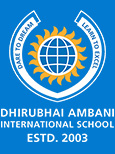frequently asked questions
-
Is the IGCSE Programme recognized by schools and universities worldwide?Open or Close
Yes.
-
Is the IGCSE Programme recognized by higher secondary boards and universities in India?Open or Close
Yes, it is recognized by CBSE, CISCE and state education boards in India as a qualification for entry to Class XI or for other higher secondary education courses. It is also a recognized Class X qualification, as one of the prerequisites for admission to undergraduate courses in India.
-
What are the benefits of IGCSE, when compared with other examinations that might be
taken
in Classes IX and X?Open or Close
Firstly, it is an international examination with worldwide recognition and credibility;
Secondly, it encourages – indeed, demands – the questioning and discovery method of learning, rather than relying on rote learning;
Thirdly, it provides excellent preparation for the International Baccalaureate Diploma Programme that Dhirubhai Ambani International School students follow in Classes XI and XII. Students who have taken the IGCSE Programme will be familiar with the styles of learning and the expectations of the IBDP;
Lastly, the coursework and practicals provide strong skills development and application orientation. -
Which foreign languages will be offered?Open or Close
We currently offer Spanish and French as foreign languages.
-
Can an IGCSE student at Dhirubhai Ambani International School continue his / her studies
at another IGCSE authorized school if the need arises?Open or Close
Yes, as all IGCSE authorized schools across the world follow a common curriculum. IGCSE students, like IB students, enjoy enormous mobility and transferability. However, admission to another school will be subject to the admissions policy of that school and the availability of places and subjects on offer.
-
What options are available after completing the IGCSE Programme?Open or Close
Although our Class X students have the opportunity to seek admission to the IB Diploma Programme in Classes XI and XII, the final choices are driven by considerations of their own plans about further learning and future career preferences as well as the School’s standards of academic performance / achievement and norms of acceptable behavior. For students who do not choose to pursue the IB Diploma Programme at our School, other options include GCE 'A' Levels, the Advanced International Certificate of Education and the North American Advanced Placement Test. The IGCSE board examinations are held in May-June and the results are announced online in the 2nd week of August every year, with the print copies of results available in the School by the 3rd week of August. The certificates are issued mid-October. These timelines do not synchronize with the admissions schedules of the Indian +2 boards (ISC/CBSE/HSC). Thus, the time-lag between the announcement of IGCSE results and the Class XI admissions timelines in India acts, to some extent, as a limiting factor with respect to options within the Indian curriculum. IGCSE students are eligible for admission to Junior Colleges in Mumbai on the basis of published results only.
It is also pertinent to note that students who pursue programmes like the IB Diploma, GCE 'A' Levels and so on, after their IGCSE Class X, will also have the option to study at universities in India.
www.cambridgeinternational.org

